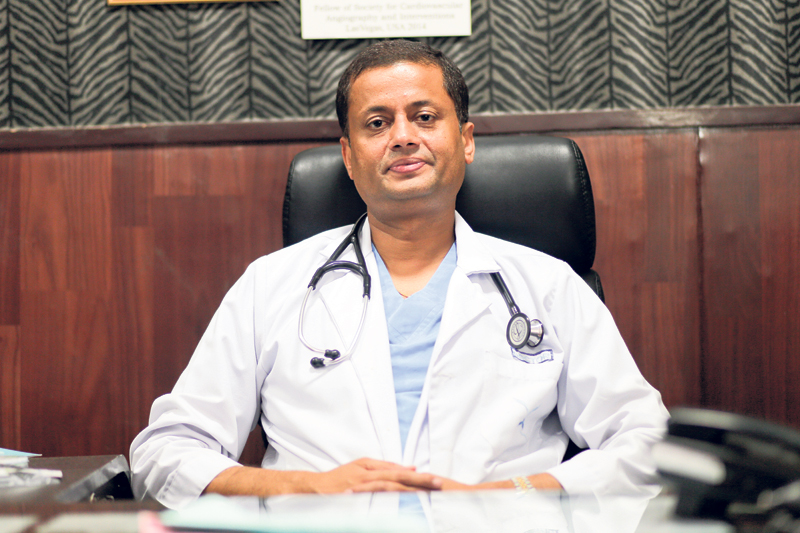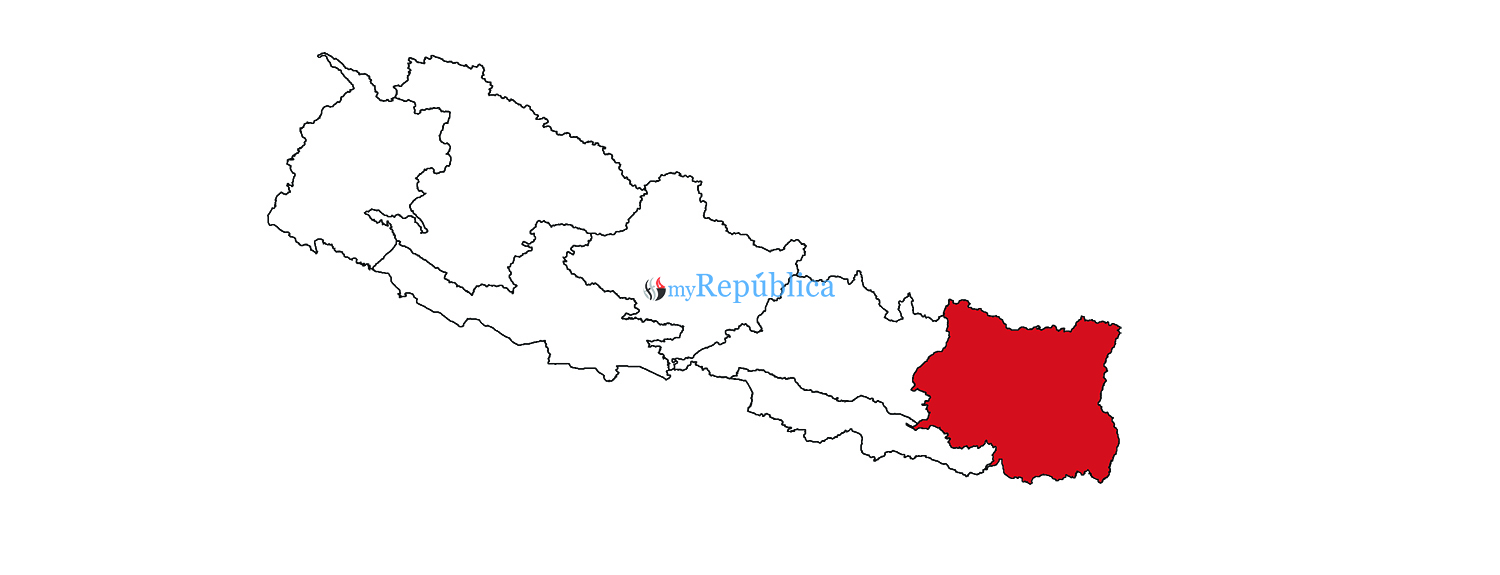
OR

With the lifestyle that people have adopted today, cardiovascular diseases are quite common.
KATHMANDU, Oct 21: Dr. J.P. Jaiswal, senior consultant cardiologist at Norvic International Hospital, tells you all that you need to know about keeping your heart healthy. After his MBBS from Calcutta University and MD from Banaras Hindu University, Dr Jaiswal trained in the field of Interventional Cardiology at All India Institutes of Medical Sciences (AIIMS), Delhi. He has performed over 2500 coronary and non-coronary procedures so far besides conducting several free outreach community camps all over the country.
How prevalent are cardiovascular diseases nowadays?
With the lifestyle that people have adopted today, cardiovascular diseases are quite common. If you ask me, about 5% of population in Kathmandu alone is at risk of coronary artery disease. Hypertension is one of the major cardiovascular problems owing to the lifestyle habits embraced by Nepalis. It reflects Nepal in an ascending epidemic of coronary artery disease and other heart ailments.
What factors are mainly responsible for heart disease?
A lot of components are to blame for it. Hypertension is one of them and it’s the most common cause behind coronary artery disease. Similarly, diabetes also contributes towards heart disease along with high levels of Low Density Lipoprotein or LDL cholesterol (the bad cholesterol) leading to a condition called dyslipidemia. Obesity plays an essential part as well. Habits such as smoking and too much alcohol consumption are well-known culprits that cause heart defects. If someone has a family history of cardiovascular conditions, i.e. if their parents died before the age of 60 due to it, they are likely to have had the debility passed onto them through genes.
Does inclination to smoking or drinking have anything to do with heart disease? Is drinking in moderation good for the heart?
Smoking is among the major culprits associated with cardiovascular disease. It results in the elevation of blood pressure. As a consequence, heart is dilated due to which it can’t contract normally and is unable to pump blood well. It becomes weaker, advancing to heart failure. About 55% of heart attacks are due to high blood pressure, followed by cholesterol and diabetes. So if smoking is your weakness, chances are you might probably be acquainted with heart problems.
Alcohol, on the other hand, may be actually advantageous for heart if consumed within certain limits. 12 ounces, which is equivalent to two pegs of 30 milliliters of liquor, can prove to be an ideal quantity. Or you could enjoy up to two glasses of red wine or a can of beer a day. It increases High Density Lipoprotein (HDL) cholesterol, also referred to as the good cholesterol. A one percent rise in HDL cholesterol reduces the risk of heart attack by two percent. This is the reason why I recommend controlled liquor consumption. However, those who have high blood pressure should not drink as it further raises the blood pressure, making them prone to heart disease.
What can be done to lower the risk of developing cardiovascular ailments?
You can prevent yourself from contracting a heart disease by leading a disciplined life. Firstly, you need to control your blood pressure by the means of healthy routine or taking medicines. Keep you sugar levels in check as well. Quit smoking or at least try to deduct it to as less as you can. Reduce your bad cholesterol by following a healthy diet. If you have a Body Mass Index (BMI) more than 27, you may have to work on your weight and get rid of that extra fat. Also, sedentary lifestyle needs to be replaced by an active schedule. For those with congenital conditions, you cannot manipulate your genes, at least not yet, but you can definitely work on trying to prevent it.
Stress management is also a must if you want keep away heart diseases as stress is hazardous in all aspects. Prolonged use of contraceptive pills has also been noted as a risk factor so it’s best to keep its use to a minimum.
How much physical activity and what kind of diet are ideal to keep the heart healthy?
Everybody is too busy these days. But one just needs about 30 to 45 minutes of brisk walking for 150 minutes a week, which is at least five days a week. I believe it will be adequate and worth the effort and time.
Salt restriction should be considered. About 2.3 grams of salt per day would be optimal. DASH diet would work wonders as it’s a multipurpose diet. Include fruits, green leafy vegetables, Bengal gram, oat bran and nuts such as almonds in your dietary plan. Soy milk has great benefits for the heart. Avoid trans fats and add polyunsaturated fatty acids and monounsaturated fatty acids (MUFA and PUFA) through foodstuffs like avocados, peanut butter, nuts, seeds, olive oil, peanut oil, canola oil, sesame oil, soybean oil, corn oil, salmon, trout, mackerel, herring, walnuts, and sunflower seeds.
Is there any myth about heart diseases among people?
One of the most common misconceptions is that most of people confuse abdominal pain for heart pain and panic uselessly when in fact it’s the case of mere gastric pain which is very common in Nepalis people. However, it is similar. Whenever you walk, run or climb stairs, the pain worsens if it is heart pain. But in case of gastric cramp, the intensity of the pain remains the same even when you carry out exhausting works. That’s one way to distinguish between the two conditions. What I’d advise is not to google your symptoms and self medicate. Consult a doctor and let an expert figure out what you need to do.
For your heart related queries, ask our health expert, Dr Jaiswal.
Write to us at theweek@myrepublica.com
You May Like This

Heart to Heart with Malvika: Learn from your mistakes
Opening up your heart. ... Read More...

Infographics: Your tattoo could prevent you from getting your dream job
Having a tattoo reduces your chances of getting a job, says a recent report. Face tattoos irk employers the most. Read More...

Heart to heart with Malvika
Dear Malvika, I am in love with a guy who is already in a relationship and we are both living... Read More...
Just In
- UAE secures spot in ACC Premier Cup final, defeating Nepal by six wickets
- NC to boycott Gandaki Province Assembly, submits letter to Speaker
- 850 grams of gold seized from Indian national at TIA
- Rupandehi District Court orders to release Dipesh Pun on a bail of Rs 400,000
- Teachers’ union challenges Education Minister Shrestha's policy on political affiliation
- Nepal sets target of 120 runs for UAE in ACC Premier Cup
- Discussion on resolution proposed by CPN-UML and Maoist Center begins in Koshi Provincial Assembly
- RBB invites applications for CEO, applications to be submitted within 21 days












_20240311121839.jpg)





Leave A Comment